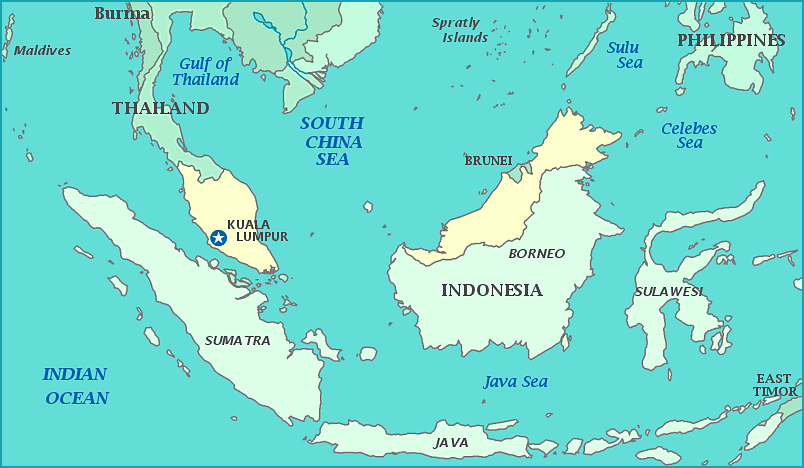
Quill's Quiz - 1100 Question US Mega Geography Quiz
Print this map of Malaysia US States and Capitals Map Quiz
Free Maps, Map Puzzles and Educational Software: Owl and Mouse Educational Software
Print this map of Malaysia US States and Capitals Map Quiz
Free Maps, Map Puzzles and Educational Software: Owl and Mouse Educational Software
Malaysia lies in the South China Sea and almost surrounds the Kingdom of Brunei. The two islands were known as Tana Melgu or Malayland before the arrival of European settlers. Today it consists of thirteen states, each divided along the borders of ancient kingdoms.
Human habitation began 40,000 years ago; early man traveling to the islands by primitive boats and finding the islands full of timber, fruits, and fish. Later, traders from China and India built ports from the 12th-3rd centuries, bringing with the them the religions of Hinduism and Buddhism. Traders from further away arrived, bringing Islam in the 14th century. Malaysia was not without its own culture and power; the prominent Languska kingdom arose in the 2nd century CE and lasted until the 15th century. Following the decline of the Languska Kingdom, Prince Paramsewara founded the Malacca Sultanate, which is often considered the first free state of Southeast Asia.
Europeans, upon discovering the islands, wasted little time in trying to take them for their own country. While Malacca was conquered by Portugal in 1511, followed by the Dutch in 1641, it was ultimately the British who would begin to make the biggest mark, starting in 1786, when the Sultan Kedah leased the city of Panang to the British East India Company. Britain continued to buy up land, including Singapore in 1819, and the city of Malacca in 1824. By the 20th century, all Malay states had British advisers, rulers were bound by treaties to defer to them instead of using their own power. Britain soon abandoned all pretenses and took control directly, holding power over Malaysia until mid-WWII, when the Japanese invaded. Despite Japan occupying Malacca, North Borneo, Sarawak, and Singapore, Malays were adverse to the idea of independence at first, not wanting to give ethnic Chinese or Japanese who lived there citizenship or the right to vote. Eventually independence was fought for and gained in 1963 with territorial disputes later solved by the ICC.
Freedom of religion is protected by the constitution, yet Islam remains the state religion and there has long been a debate over whether to follow secular laws or Sharia laws, including the death penalty for homosexuality. Sixty-one percent of the population practices Islam, with 19.8% practicing Buddhism, 9.2% Christianity, 6.3% Hinduism, 1.3% Chinese religion and 0.7% atheist. Malaysia has never recognized the country of Israel, though it accuses Israel of many international crimes. 91.8 percent of the population is ethnic Malay, or Bumiputera.
Malaysia is highly diverse country in terms of wildlife; it is home to 150 amphibians and 250 reptiles including 150 snakes. Logging is one of the greatest threats to the creatures on the islands, as over 80% of Sarawak forests have been cleared and continued logging rates are estimated to make most indigenous species extinct by 2020. Another threat is illegal fishing, which involves poison and dynamite in the pursuit of endangered species to sell on the black market.
Human habitation began 40,000 years ago; early man traveling to the islands by primitive boats and finding the islands full of timber, fruits, and fish. Later, traders from China and India built ports from the 12th-3rd centuries, bringing with the them the religions of Hinduism and Buddhism. Traders from further away arrived, bringing Islam in the 14th century. Malaysia was not without its own culture and power; the prominent Languska kingdom arose in the 2nd century CE and lasted until the 15th century. Following the decline of the Languska Kingdom, Prince Paramsewara founded the Malacca Sultanate, which is often considered the first free state of Southeast Asia.
Europeans, upon discovering the islands, wasted little time in trying to take them for their own country. While Malacca was conquered by Portugal in 1511, followed by the Dutch in 1641, it was ultimately the British who would begin to make the biggest mark, starting in 1786, when the Sultan Kedah leased the city of Panang to the British East India Company. Britain continued to buy up land, including Singapore in 1819, and the city of Malacca in 1824. By the 20th century, all Malay states had British advisers, rulers were bound by treaties to defer to them instead of using their own power. Britain soon abandoned all pretenses and took control directly, holding power over Malaysia until mid-WWII, when the Japanese invaded. Despite Japan occupying Malacca, North Borneo, Sarawak, and Singapore, Malays were adverse to the idea of independence at first, not wanting to give ethnic Chinese or Japanese who lived there citizenship or the right to vote. Eventually independence was fought for and gained in 1963 with territorial disputes later solved by the ICC.
Freedom of religion is protected by the constitution, yet Islam remains the state religion and there has long been a debate over whether to follow secular laws or Sharia laws, including the death penalty for homosexuality. Sixty-one percent of the population practices Islam, with 19.8% practicing Buddhism, 9.2% Christianity, 6.3% Hinduism, 1.3% Chinese religion and 0.7% atheist. Malaysia has never recognized the country of Israel, though it accuses Israel of many international crimes. 91.8 percent of the population is ethnic Malay, or Bumiputera.
Malaysia is highly diverse country in terms of wildlife; it is home to 150 amphibians and 250 reptiles including 150 snakes. Logging is one of the greatest threats to the creatures on the islands, as over 80% of Sarawak forests have been cleared and continued logging rates are estimated to make most indigenous species extinct by 2020. Another threat is illegal fishing, which involves poison and dynamite in the pursuit of endangered species to sell on the black market.


